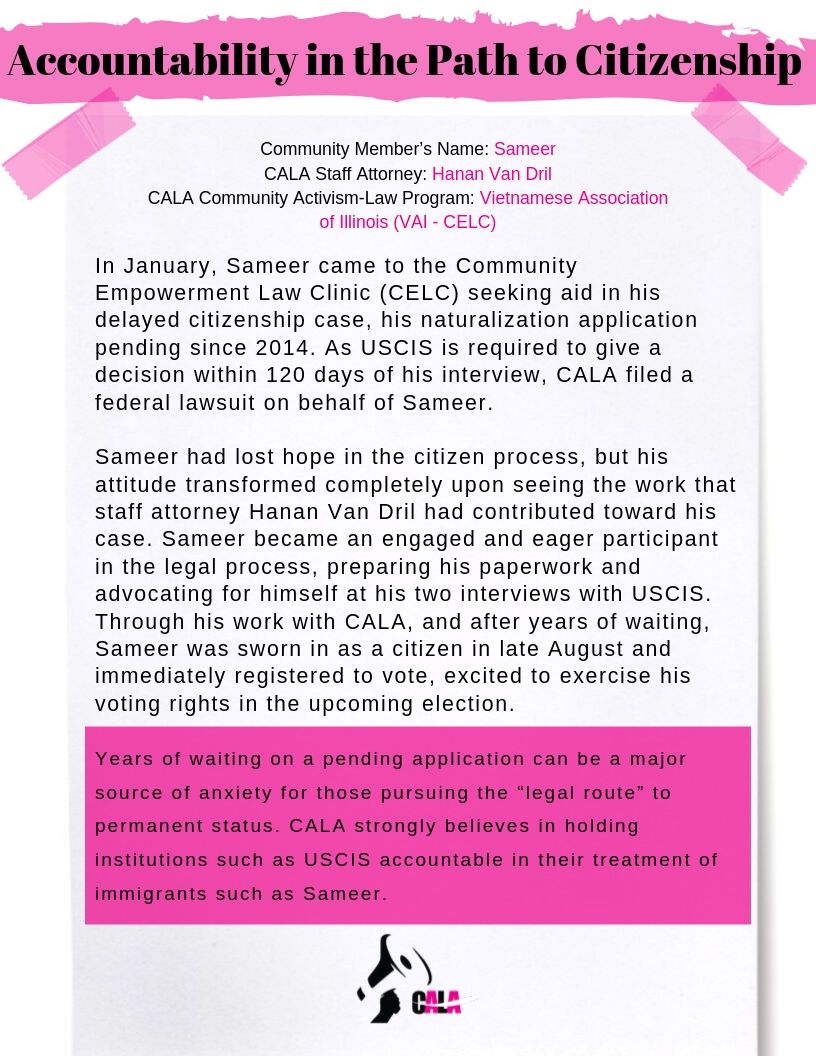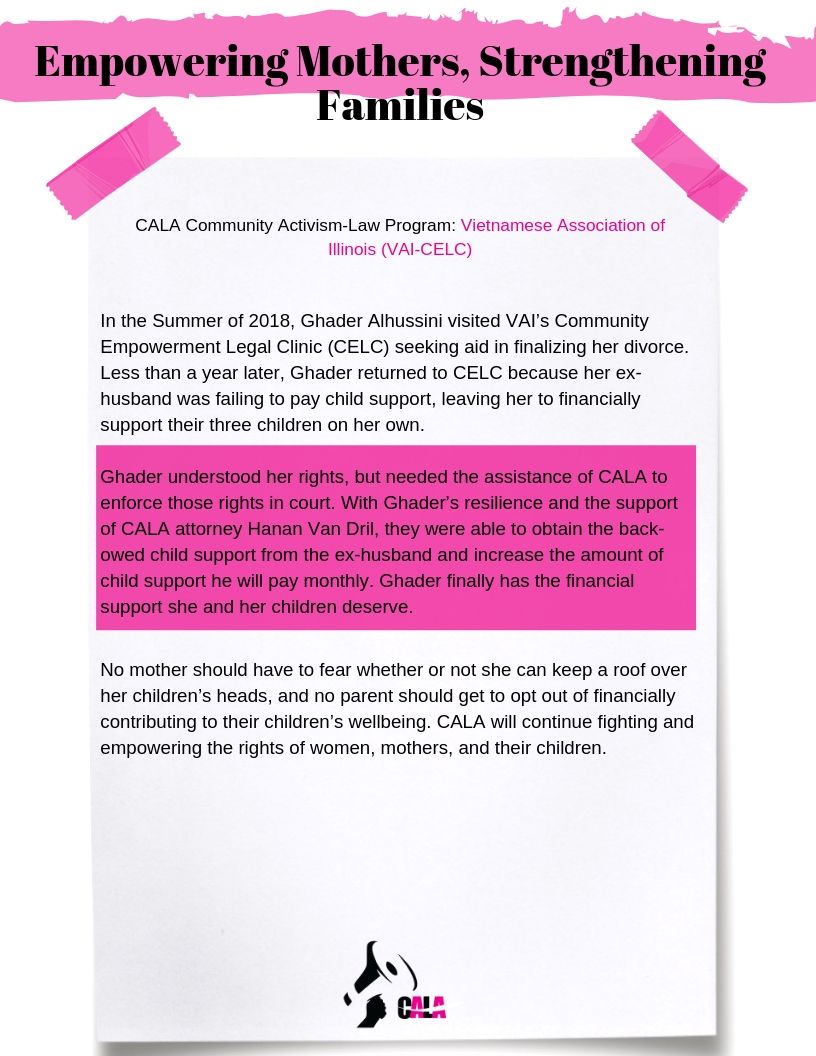Millions of tenants are facing an increasing risk of losing their homes as eviction moratoria end and stimulus benefits are cut. Beyond Legal Aid and our partners are fighting back.
Lawyers: Stop, Listen, and Learn from Communities
A final story to end your week on a note of hope and victory: Francisco, Patti, and their son, Javier, who were finally reunited after months of agonizing separation. Two weeks ago! Not only is this the most recent story but it's also one of the most important learning experiences for us. Our mission is to shift the power of the law into the hands of communities. But we pursue that mission not from a place of hierarchy, but one of collaboration, reciprocal learning, and mutual transformation. We genuinely learn--we become better lawyers--because community members, activists, and leaders are continually teaching us how to do our work better. And Francisco's story reminds us (yet again) that communities can and do teach us about lawyering, even about how to litigate!
Two weeks ago, Patti received a call from government officials: Francisco could come home from the Kankakee Detention Center. Where he had been detained since last fall. Their reunion and his continuing fight for justice is a testament to Beyond Legal Aid’s commitment to shifting the power of the law into the hands of communities. Because Beyond’s lawyers listened—and more importantly, deferred—to the community on a critical litigation decision.
In 2016, Francisco was apprehended ICE after he was arrested on a DUI charge. Organized Communities Against Deportation (“OCAD”) requested Beyond to join Francisco’s campaign as our model of being community-located, community-operated, and community-directed was critical. Francisco came to the United States in 1999 in search of the “American dream” and to escape poverty. Since his arrival, Francisco has settled in the Chicago neighborhood of Albany Park. He lived there with Patti, his partner of more than 16 years, and their 16-year-old citizen son, Javier. For nearly 20 years, he has been a well-respected and valued member of the community; described as someone always willing to help, a good father, a good partner, a hard worker, and someone with strong family values.
In 2019, ICE detained Francisco, and his family suffered tremendously as a result of Francisco’s detention. Since Francisco’s detention, Patti’s medical condition worsened, and she received emergency medical treatment for temporary facial paralysis after an anxiety attack. Francisco’s son, Javier, had been severely depressed, stressed, and developed behavioral problems.
From the fall of 2019 through January of 2020, Francisco was scheduled for four hearings for which OCAD and Beyond packed the courtroom gallery. Francisco’s community support was visually apparent and noted by the government and the Immigration Judge. At Francisco’s first bond hearing, the Immigration Judge denied bond. Between his hearings, Francisco and OCAD wanted to try for another bond hearing. Although the likelihood of success was low, and Beyond lawyers initially recommended against the strategy due to standard legal procedures, we nonetheless deferred to OCAD’s decision and still lent our voice to Francisco and OCAD—our community activism lawyering model puts the community in charge and has never prioritized being standard!
Javier testified and provided emotionally heart-wrenching testimony at his father’s bond hearing that his depression, stress, and behavioral disorders had intensified to the point of suicidal ideations. Despite the numerous witnesses, community support, and arguments for Francisco’s release, the Immigration Judge still denied his bond again. In preparation for Francisco’s final hearing, Francisco and OCAD activists primarily made the decisions on who should be called as witnesses and what should be highlighted for the court. Evidence and testimony presented at Francisco’s hearing was community-driven and community-directed.
During this time, the Attorney General issued several unfavorable decisions directly undermining Francisco’s chance of success for cancellation of removal and waiver of inadmissibility. It was also a critical time as Immigration Judges nationwide began expressing discontent with the Attorney General’s (over)reach of the Immigration Courts.
Two months ago, in a small court in the basement of 101 Congress, the gallery and hallways were filled with Francisco’s community. During a four-hour hearing, every single supporter found their way into the courtroom in a synchronized fashion. Despite the Immigration Judge’s previous bond decisions and unfavorable caselaw, the Immigration Judge was clearly affected by Francisco’s situation, the overwhelming outpour of community support, and granted Francisco’s applications for relief from removal. One of Beyond’s lawyers admitted shock at this courageous act of judicial activism!
It was a resounding victory for all – Francisco fighting for his family, OCAD for their community member, an Immigration Judge for judicial independence, and Beyond for proving the power of organizers and activists fighting for their community in partnership with lawyers.
After waiting with bated breath for several weeks, the Government appealed the Immigration Judge’s decision which meant that Francisco would remain detained while his appeal was appending. But due to Francisco’s health condition and the current pandemic, Francisco was release from ICE custody. During these uncertain times, Francisco has been finally reunited with his family and his community.
"This is the first time in my life I have seen justice."
Today we want to share the powerful story of a courageous woman whose fight for justice moved us, our community partner Mano a Mano Family Resource Center, and most importantly an Immigration Judge who acted beyond "other judges."
Ms. Diaz came to Mano a Mano Family Resource Center (“Mano”) in Round Lake after having been turned away from other immigration-based legal aid organizations. She suffered brutal domestic violence at the hands of her ex-husband who continued stalking, abusing, and raping her even after she had divorced him in Honduras. He would drag her through the streets and shout names at her, but no one who witnessed the abuse would do anything.
The current administration has significantly weakened the law supporting domestic-violence-based asylum claims. Beyond was initially hesitant to take the case because of capacity and Ms. Diaz's was a case on the family unit docket, which meant that the final hearing would take place quickly--at a time when we were overextended with deportation cases. Ms. Diaz's case was also more challenging logistically because she was staying at a women's shelter in Lake County with her 10 year old daughter, which limited our attorneys' access to meeting with her.
Luckily, the shelter had connections to Mano; so it was a sympathetic case that Mano wanted Beyond attorneys to take on: so we did, because our community partners call the shots! Even if the legal argument wasn't strong, Mano decided we had to at least give Ms. Diaz a chance to tell her story and fight for her right to a full and fair hearing in immigration court.
Importantly, Mano continued to provide support with translation, logistics, and meeting space. Mano worked with Ms. Diaz to ensure that she and her daughter were safe and that she could gather all the available supporting evidence for her asylum application; they even supported to ensure she could get to appointments and court hearings. With Mano and Beyond staff working together, the case was fully briefed, prepared, and ready for court.
After Ms. Diaz courageously and powerfully shared to the court some of the most traumatic and painful memories of her life, the Immigration Judge said that, while not all judges would, she would grant Ms. Diaz asylum. Even the government attorney was moved and waived appeal, despite recent decisions by the Attorney General undermining asylum for victims of domestic violence. Against the odds, Ms. Diaz had won her case. Still physically shaking after reliving her trauma, Ms. Diaz told Equal Justice Works Fellow and staff attorney Ali Heinen that she was in shock. She took a moment, then asked if she could address the judge. After thanking the judge, Ms. Diaz told the courtroom "This is the first time in my life I have seen justice."
Fighting—and Winning—When Other Lawyers Said No
As we enter another week of the COVID-19 pandemic and social distancing, we want to share with you some of the amazing, and hopefully uplifting, stories that keep us going. They also inspire our incredible gratitude to be able to continue our work: in, with, and directed by communities most adversely impacted by the current crisis.
The first story is particularly poignant as we support our community partners to fight for the release of detainees, like Beto, who for nine months could not be at home, go for a walk, take a breath of fresh air, or eat his favorite food that his mother makes. It also has incredible meaning to the Beyond team because it was a case that other legal aid organizations were unwilling to take. Beto's freedom affirms our core belief that it is communities and community members most impacted by injustice who should decide what cases deserve legal representation--not lawyers. Read his story, and its media coverage, below.
We thank you for your support and hope Beto's victory starts your week off well. We hope the stories we share with you this week will remind you of the fight, spirit, and beauty in our communities. They make us better lawyers and stronger human beings.
Fighting—and Winning—When Other Lawyers Said No
At 3 am on a Tuesday morning last month, Jesus “Beto” Gutierrez’s parents stood at a bus station stop, awaiting their son’s arrival. For 9 months, Beto had been jailed by ICE and deprived of his rights as a recipient of DACA (Deferred Action for Childhood Arrivals). But because of a unique collaboration between lawyers at Beyond Legal Aid (Beyond) and organizers with Organized Communities Against Deportations (OCAD), Beto would return to his community, freed to pursue DACA renewal and protection against deportation.
Beto’s struggle for freedom began in May 2019, when he was arrested in Iowa. Charges against him were quickly dropped, but Iowa law enforcement delivered Beto to ICE. Even though Beto was a DACA recipient eligible for DACA renewal, meeting the exact criteria for protection from deportation, the federal government detained him and sought his deportation. Beyond Legal Aid led a complex legal strategy that relied on lessons learned from other fights against deportation: winning a deportation defense case often requires both legal pressure and community activism. Other campaigns to prevent the deportation of young DACA recipients had involved mass mobilization as well as creative federal litigation.
In December 2019, Beyond Legal Aid filed two federal lawsuits, along with his immigration cases--in three different states--challenging ICE’s illegal deprivation of Beto’s rights under the DACA program and his prolonged detention without release on bond. Meanwhile, OCAD mobilized support for Beto organizing pack-the-courtrooms, call-in’s, and fundraisers. They also worked closely with Beto’s family to support his legal case. The experiences of communities across the country engaged in community deportation defense makes clear that legal advocacy is not enough to win campaigns; media attention and community action are critical.
As a result of Beyond Legal Aid and OCAD’s work, the federal government agreed to a new bond hearing, at which Beto was granted bond, which his community raised the money to pay, leading to his release and return home. Beto’s release exemplifies the unique strength of Beyond Legal Aid’s model. Beto overcame substantial obstacles to win his release, including a harmful finding by an immigration judge that would have prevented his relief. Other public interest law organizations declined to take Beto’s case because they found this obstacle too difficult to overcome; Beyond Legal Aid identified a path to overcoming this obstacle by combining legal and community power, and ultimately succeeded in winning Beto’s release.
Beto continues to seek his DACA renewal, which will protect him against deportation once granted. He also continues to challenge ICE’s illegal denial of his rights under DACA and the rights of others through his Administrative Procedure Act lawsuit. But most importantly, Beto is able to do all of this from his home, with the support of his community, able to go for a walk or take a breath of fresh air, able to eat his favorite food that his mother makes, because he has been released.
Read more about Beto's fight:
https://chicago.suntimes.com/2020/3/3/21152901/daca-jesus-alberto-lopez-gutierrez-ice-detention-bond-immigration, https://es-us.noticias.yahoo.com/joven-beneficiario-daca-libre-chicago-201535586.html
https://www.chicagoreader.com/chicago/fight-to-release-beto/Content?oid=77404793
https://wearemitu.com/things-that-matter/daca-recipient-suing-federal-government/
https://www.efe.com/efe/usa/inmigracion/joven-beneficiario-de-daca-libre-al-fin-en-chicago-extranaba-comida-mexicana/50000098-4187356, http://www.latinxtoday.com/3838_inmigracion/6575876_joven-sonador-mexicano-detenido-por-ice-lucha-por-evitar-deportacion.html/www.lowcountryfurnituresc.com
A Family Reunited
For over a year, Jeanna has worked with Beyond Legal Aid attorney Wally Hilke to return her child from the Department of Children and Family Services (DCFS). Jeanna was suddenly separated from her child after three months of regularly visiting her and caring for her in a hospital prenatal unit. After the separation, she endured discouragement, lecturing, and punitive practices from a child protection system that purported to be supporting her.
Despite this painstaking process, Jeanna remained active in her case, organizing a community-led convening of parents who had experienced similar hardships relating to family separation. At the same time, she remained devoted to her child, participating in a grueling schedule of DCFS-imposed programming. Through her experience with family separation, she learned the difficulties of navigating the DCFS system and the importance of parent-led advocacy. After several months of persistence, and with Wally’s legal representation, Jeanna was finally reunited with her child.
Family separation creates distress and trauma for everyone involved; the child, the parents, and their community. Jeanna took a proactive role in her case, building power within her community to approach the issue through discussion and collaboration. Beyond Legal Aid is proud of her initiative, and will continue to fight to keep families and communities together.
Accountability in the Path to Citizenship

Empowering Mothers, Strengthening Families

Standing Up, Speaking Out

A Courageous Journey To Asylum

Overcoming Roadblocks to Citizenship



